英语基础模块1-unit2-i-can-do-it-课件
基础英语1Unit2课件

play checkers
skip with the skipping rope
Choose the proper answer to each of the sentences. (1)A:_______ John clean the meeting roo B:No,I’m sorry.He________. A:Can;can B:Can’t;can C:Can;can’t
Unit 2 I can do it !
授课人:李玲年
教学目标: (一)知识目标: 1.学生能掌握描述个人能力的词汇,如speak Chinese,
drive cars, repair computers, teach English, read in Chinese, serve customers; 2.学生能掌握询问和描述个人能力时所使用的句型,如: Can you say something about yourself? Can you sing Englቤተ መጻሕፍቲ ባይዱsh songs? I can teach English and I can speak a little Chinese. (二)能力目标: 1.学生能听懂关于询问和描述个人能力的对话; 2.学生能罗列个人能力,并询问和了解同学的个人能力。 (三)情感目标:学生能欣赏自我,欣赏他人。
教学重、难点 教学重点
1.掌握描述个人能力的词汇; 2.情态动词can的用法(肯定式、 否定式、疑问式及其回答)。
教学难点
通过与个人能力描述相关的词汇 和句型的学习,学会采访同学,
介绍自己。
情态动词can的基本句型 1.肯定句:主语+can+动词原形+其它。
2.否定句:主语+can not(can't) +动词原形+其它。
高教版中职英语基础模块-第1册unit-2《i-can-do-it》教案.doc
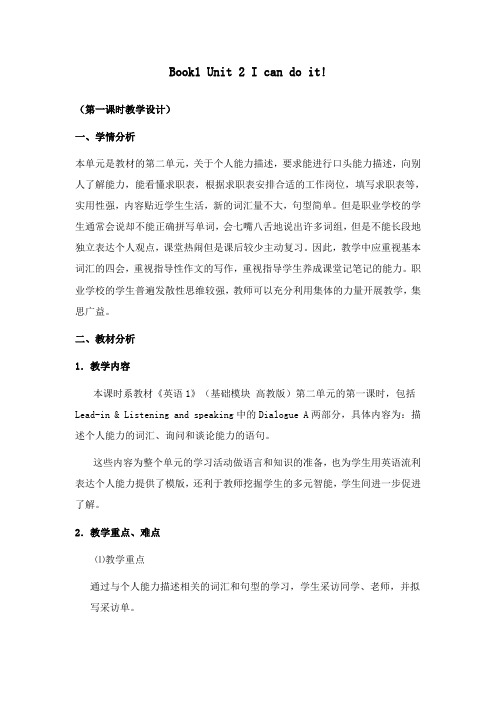
Book1 Unit 2 I can do it!(第一课时教学设计)一、学情分析本单元是教材的第二单元,关于个人能力描述,要求能进行口头能力描述,向别人了解能力,能看懂求职表,根据求职表安排合适的工作岗位,填写求职表等,实用性强,内容贴近学生生活,新的词汇量不大,句型简单。
但是职业学校的学生通常会说却不能正确拼写单词,会七嘴八舌地说出许多词组,但是不能长段地独立表达个人观点,课堂热闹但是课后较少主动复习。
因此,教学中应重视基本词汇的四会,重视指导性作文的写作,重视指导学生养成课堂记笔记的能力。
职业学校的学生普遍发散性思维较强,教师可以充分利用集体的力量开展教学,集思广益。
二、教材分析1.教学内容本课时系教材《英语1》(基础模块高教版)第二单元的第一课时,包括Lead-in & Listening and speaking中的Dialogue A两部分,具体内容为:描述个人能力的词汇、询问和谈论能力的语句。
这些内容为整个单元的学习活动做语言和知识的准备,也为学生用英语流利表达个人能力提供了模版,还利于教师挖掘学生的多元智能,学生间进一步促进了解。
2.教学重点、难点⑴教学重点通过与个人能力描述相关的词汇和句型的学习,学生采访同学、老师,并拟写采访单。
⑵教学难点学生了解词汇记忆的策略之一——分类记忆;学生区分出不同购物场所的特点;三、教学目标1.知识目标⑴学生能掌握描述个人能力的词汇,如speak Chinese, drive cars, repair puters, teach English, read in Chinese, serve customers。
⑵学生能掌握询问和描述个人能力时所使用的句型,如:Can you say something about yourselfCan you sing English songsWell, I can teach English and I can speak a little Chinese.2.能力目标⑴学生能听懂关于询问和描述个人能力的对话。
中职英语-基础模块1-Unit2-说课稿
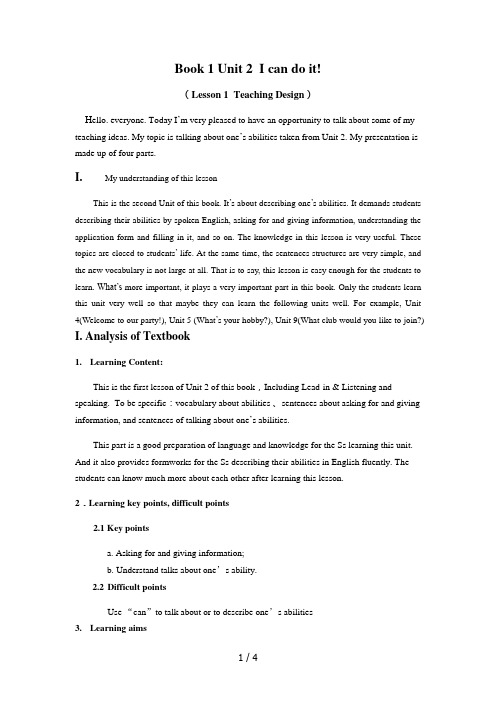
Book 1 Unit 2 I can do it!(Lesson 1 Teaching Design)H ello. everyone. Today I’m very pleased to have an opportunity to talk about some of my teaching ideas. My topic is talking about one’s abilities taken from Unit 2. My presentation is made up of four parts.I.My understanding of this lessonThis is the second Unit of this book. It’s about describing one’s abilities. It demands students describing their abilities by spoken English, asking for and giving information, understanding the application form and filling in it, and so on. The knowledge in this lesson is very useful. These topics are closed to students’ life. At the same time, the sentences structures are very simple, and the new vocabulary is not large at all. That is to say, this lesson is easy enough for the students to learn. What’s more important, it plays a very important part in this book. Only the students learn this unit very well so that maybe they can learn the following units well. For example, Unit 4(Welcome to our party!), Unit 5 (What’s your hobby?), Unit 9(What club would you like to join?)I. Analysis of Textbook1.Learning Content:This is the first lesson of Unit 2 of this book,Including Lead-in & Listening and speaking. To be specific:vocabulary about abilities 、sentences about asking for and giving information, and sentences of talking about one’s abilities.This part is a good preparation of language and knowledge for the Ss learning this unit. And it also provides formworks for the Ss describing their abilities in English fluently. The students can know much more about each other after learning this lesson.2.Learning key points, difficult points2.1 Key pointsa. Asking for and giving information;b. Understand talks about one’s ability.2.2Difficult pointsUse “can”to talk about or to describe one’s abilities3.Learning aims3.1.Knowledge aims:a. The students can grasp the vocabulary about abilities, such as, speak Chinese, drivecars, repair computers, teach English, read in Chinese, serve customers.b. The students can grasp these sentences for talking about abilities. For example,Can you say something about yourself?Can you sing English songs?Well, I can teach English and I can speak a little Chinese.3.2.Ability aimsa.The students can understand the dialogues about asking and describing abilities.b.The Ss can list one’s abilities, and can ask for and know abilities of their classmates.3.3.Emotional aims:To cultivate the students’ confidence, at the same time, they can appreciate each other. II.Analysis of studentsGenerally speaking, the students in vocational school often speak just English words, they can’t spell them rightly. They usually speak out many words but they can’t express their ideas with long sentences. They are not willing to review the lessons by themselves. Thus the application of the new vocabulary, the writing, and the notes the Ss taken should be taken seriously. On the other side, the Ss have strong divergent thinking ability so that the teacher can take most use of it and have a good atmosphere.III.Teaching MethodsGames and Competition, Situational teaching, Group work, Performance, Mission,Imatation.IV.Teaching ProcedureStep One Lead-in (8 min)1.Facts or lies: Start with a game. The teacher makes a list of his abilities, and two ofthem are lies. Ask the students to pick them out.Eg. I can read in English.I can sing many English songs….(Design intent: the teacher set examples with herself so that attracting Ss’ attention and shorten the communication distance between teacher and students. And thesevocabularies can appear naturally. It also lays a solid foundation for their fluent oralEnglish.)2.Guess Who I am: The teacher gives each student a card and ask each of them tomake a list of their abilities (at least five abilities) on the card. Two of the abilities should be lies. ..(Design intent: to make the Ss find their advantages, exercise their writing and spelling abilities. Ss reading in the front of the class are good to for them to cultivateconfidence and bravery, but also their oral English. The teacher do this game can grasp students eyes tightly. What’s more, it’s also a presentation of their works.)3.Look and complete. (activity 1 on page16) Show the students a group of pictures.Then ask the students to describe each picture, using the sentence pattern“He/She/They can …” After that, the teacher may ask the students to listen to thetape and circle what Ben can do.(Design intent: the teacher can collect much more pictures to describe abilities. Through the presentation by PPT, the Ss can practice their observation ability, languageexpression ability, and fast reaction ability. )Step Two Vocabulary teaching (8 min)1.Group competition: What can we do? (1 min)The teacher divides the whole class into four groups and asks each group to write down what they can do on the blackboard in the given time. The group that offers the most phrases about abilities will be the winner.(Design intent: Group competition is good for the Ss cultivating their awareness of teamwork and fair. They practice their braveness and spelling ability when they writing on the blackboard. The four groups do it at the same time, so that the teacher can collect many vocabularies as soon as possible. And that is a good way for Ss to accumulating words. )2.The teacher types these abilities phrases on PPT (the teacher may ask a student to typethese phrases if there is a good typist in class).(Design intent: this is an important part for Ss to memorize words. Typing phrases on PPT arouse the enthusiasm of showing up. )Step Four Production (20m)1.Make a similar dialogue with your partner. Ask some group to act their dialogue. (Design intent: Imitating the dialogue is easy for Ss to do, and good for them to familiar the dialogue and grasp important words and sentences. )Step Three Listening ( Activity 4,5,6,7 ) (12 min)1.Activity 4. Read and tick. Are these abilities necessary for applying a job?2.Activity 5. Listen and circle. What abilities does Zhang Qing have?3.Activity 6.Read and underline. Read after the tape and underline the sentences about a4.Activity 7. Listen and repeat. And practice the dialogue with your partner.(Design intent: After the former part, it is easy for Ss to finish Activity 4-7. And it is mainly practice Ss’ listening and pronunciation here. )Step Five Homework(1m)1.Recite the dialogue (activity6) and make a similar dialogue.2.Remember and copy the following sentences twice.I can speak Chinese. I can drive cars. I can repair computers.…(Design intent: to strengthen all the knowledge of this lesson. )。
职高英语基础模块1UnitTwoIcandoit

Methods to improve listening skills
Regular practice
Active listening
Using subtitles
Students should practice listening regularly, both in and out of class They can listen to English language podcasts, news reports, movies, and music to improve their listening skills
• Active Listening: Encourage students to listen actively by asking questions, paraphrasing, and summarizing what they hear
• Vocabulary Expansion: Encourage students to expand their vocabulary by learning new words and phrases related to their interests and topics of conversation
Oral practice and demonstration
Role plays
Students will engage in role plays to practice speaking in different scenarios, such as making a phone call, ordering food, or asking for directions
Vocational High School English
高教版中职英语(基础模块 第1册)Unit 2《I can do it》ppt课件1
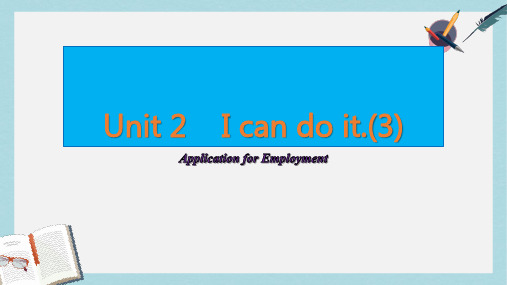
Activity 12
Think and tick. 从下列条目中勾出你认为在求职申请表中 应包含的要素。
□ n□anmaeme
□pho□npehnounme bneurmber
□ a□gaege □ ambailiitl y
□ e-mail □ e-
□ address
□ f□amabilyility
Drive a car.
Read and tick. 勾出你认为求职需要具备的能力。
I can drive a car. I can swim.
I can play basketball I can sever visitors.
I can speak good English. I can love to work with others . I can use the computer very well.
Tang Hua: Ok. That’s it.
Wang Yang: Thank you.
Act and practice. 用下面的语句和信息模仿求职者进行面试。
WhaAt’: Ws yhoautr’nsaymoeu?r name? WhaAt’: Hs oyowuor lfdirsatrneaymoeu?/ last name? WheAre: Caraenyyoouufr…om? ?
在英语国家,年龄 (age) 是个敏 感的话题,除非确有需要,如填 写个人信息等,一般不要问成年
Tang Hua: Can you use the comp人u,te尤r其? 是成年女性的年龄。
Wang Yang: Yes, I can send a e-mail and play computer games.
《I can do it》中职英语(基础模块 第1册)Unit 2【高教版】1
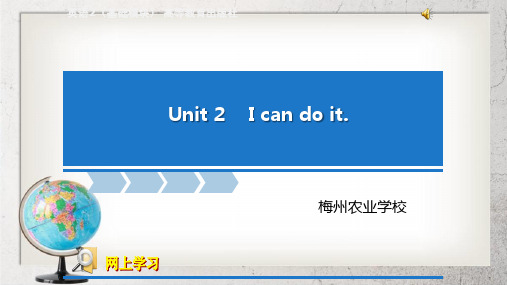
Unit 2 I can do it.
梅州农业学校
Unit 2 I can do it.(3)
教学目标
知识能力目标 学生能够理解并运用常用动词及can 询问并给出有关个人能力的信息。 学生能够读懂有关个人信息及个人能力的表格及简单句。 学生能够根据个人情况做简单介绍并制作求职申请表
Htoe awpapnlytsftoor?apply for a sales manager position . d. What’s Wang Tong’s e-mail address?
WangDong@
Compare and choose. 比较两份求职表,你认为谁能得到这个职位.
I you Yes, he / she / it can. we you they
I
you
he / she / it
Can we
…?
you
they
I
you
No,
he / she / it
we
you
they
can’t.
Look and complete. 看图,完成句子。
1) I can _ru__n____________.
Read and answer. 阅读求职表,勾出求职表后正确的句子。
a.
Name Wang Tong
Age 23
Address No. 28 Tongfang Street, Tianjin
Position applied Sales Manager Abilities I can use the computer. I can speak English. I can read and write in English. …
职高英语基础模块1-Unit-Two-I-can-do-it.ppt课件
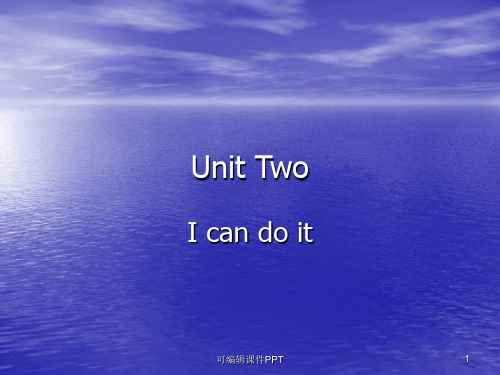
可编辑课件PPT
8
Listen and repeat.
• Bill :Good morning ,sir. • Mr Zhang: Good morning! Your name,
please? _ what’s your name ?_
• Bill: I’m Bill Brown. • Mr Zhang: can you say something about
可编辑课件PPT
6
Read and tick.
• A. I can drive a car. • B. I can swim. • C. I can use the computer. • D. I can play basketball. • E. I can serve visitors. • F. I can speak English.
games.
• Tang Hua: OK. That’s it . • Wang Yang: Thank you.
可编辑课件PPT
10
Everyday Eຫໍສະໝຸດ glish.• May I have you name?能告诉我你的名字
吗?
• Your name ,please?请告诉我你的名字。 • Where are you from?你来自哪里? • I’m from…我来自。。。
Unit Two
I can do it
可编辑课件PPT
1
New words
• repair /ri`pεə/ 修理 • computer /kəm`pju:tə/ 计算机 • Serve /sə:v/ 服务 • customer /kʌstəmə/ 顾客 • teach /ti:tʃ/ 教,教书 • something /`sʌmθiŋ/ 一些事 • yourself /jɔ:`self/ 你自己 • join /dʒɔin/ 参加 • club /klʌb/ 俱乐部 • ability /ə`biləti/ 能力 • application /æpli`keiʃən/ 申请 • employment /im`plɔimənt/ 工作,职业 • gender /`dʒendə/ 性别 • position /pə`ziʃən/ 职位 • french /frentʃ/ 法语,法国的 • apply for 申请 • sales manager 销售经理 • in English 用英语 • I’d like to… 我想…
高教版中职英语基础模块-第1册unit-2《i-can-do-it》教案
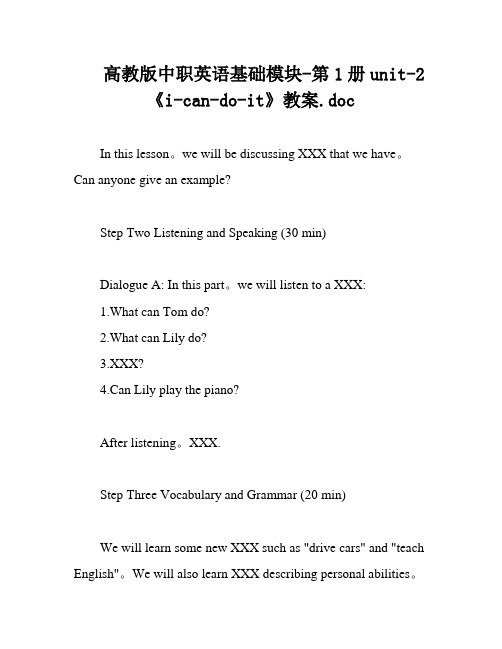
高教版中职英语基础模块-第1册unit-2《i-can-do-it》教案.docIn this lesson。
we will be discussing XXX that we have。
Can anyone give an example?Step Two Listening and Speaking (30 min)Dialogue A: In this part。
we will listen to a XXX:1.What can Tom do?2.What can Lily do?3.XXX?4.Can Lily play the piano?After listening。
XXX.Step Three Vocabulary and Grammar (20 min)We will learn some new XXX such as "drive cars" and "teach English"。
We will also learn XXX describing personal abilities。
such as "Can you say something about yourself?" and "Well。
I can teach English and I can speak a little Chinese."Step Four Interview and Writing (20 min)We will practice interviewing our classmates about their personal abilities and writing down their answers。
This will help us practice using XXX.Step Five n (10 min)We will take some time to reflect on what we learned today and how it can be applied in our daily lives。
高教版中职英语基础模块-第1册unit-2《i-can-do-it》教案.doc

Book1 Unit 2 I can do it!(第一课时教学设计)一、学情分析本单元是教材的第二单元,关于个人能力描述,要求能进行口头能力描述,向别人了解能力,能看懂求职表,根据求职表安排合适的工作岗位,填写求职表等,实用性强,内容贴近学生生活,新的词汇量不大,句型简单。
但是职业学校的学生通常会说却不能正确拼写单词,会七嘴八舌地说出许多词组,但是不能长段地独立表达个人观点,课堂热闹但是课后较少主动复习。
因此,教学中应重视基本词汇的四会,重视指导性作文的写作,重视指导学生养成课堂记笔记的能力。
职业学校的学生普遍发散性思维较强,教师可以充分利用集体的力量开展教学,集思广益。
二、教材分析1.教学内容本课时系教材《英语1》(基础模块高教版)第二单元的第一课时,包括Lead-in & Listening and speaking中的Dialogue A两部分,具体内容为:描述个人能力的词汇、询问和谈论能力的语句。
这些内容为整个单元的学习活动做语言和知识的准备,也为学生用英语流利表达个人能力提供了模版,还利于教师挖掘学生的多元智能,学生间进一步促进了解。
2.教学重点、难点⑴教学重点通过与个人能力描述相关的词汇和句型的学习,学生采访同学、老师,并拟写采访单。
⑵教学难点学生了解词汇记忆的策略之一——分类记忆;学生区分出不同购物场所的特点;三、教学目标1.知识目标⑴学生能掌握描述个人能力的词汇,如speak Chinese, drive cars, repair puters, teach English, read in Chinese, serve customers。
⑵学生能掌握询问和描述个人能力时所使用的句型,如:Can you say something about yourselfCan you sing English songsWell, I can teach English and I can speak a little Chinese.2.能力目标⑴学生能听懂关于询问和描述个人能力的对话。
中职英语unit2-I-can-do-it.ppt课件

He is a man. His name is … He is from… He is … years old. He wants to apply for the position of… He can … He can … His phone number is …. His e-mail address is …
4
speak Chinese drive a car repair a computer
teach English play basketball serve the customer
Can you ….? Ye可s编,辑课I件cPPaTn. No, I can’t. 5
What can Bill do?
可编辑课件PPT
13
职位
position
工程师 engineer
经理
Hale Waihona Puke manager秘书
secretary
公司
company
护士
nurse
老师
teacher
修理计算机
repair the computer
服务顾客
serve the customer
参加 俱乐部
join club
申请
apply for
Bill can teach English. He can speak a little Chinese. He can sing English songs.
可编辑课件PPT
6
What can Wang Yang do?
Wang Yang can send E-mails,. He can play computer games.
高教版基础模块unit2ICanDoIt优质课件

Eager to learn something knowledgeable and interesting
Lack of confidence and proper method of study
Analysis of Teaching material
Analysis on The Teaching Material
Difficult Points
Teaching Methods
municative Approach 2.Task-based Teaching Approach 3.Total Situational Action
Teaching Aids
A computer and a multi-media courseware.
Step 3. Pre-reading (10 min)
Vocabulary and Exercise
1. Think and Tick (3 min) What information is there in the
blanks according to the application in page 20 and page 21?
Step 4 While-reading (10 min)
Students’ Activities
Task 1. Brainstorm. (4 min) T: What kinds of position could apply for as a member of Marketing major?
Dressing (1 score)
Total (10 scores)
Group B
Group C
Group D
- 1、下载文档前请自行甄别文档内容的完整性,平台不提供额外的编辑、内容补充、找答案等附加服务。
- 2、"仅部分预览"的文档,不可在线预览部分如存在完整性等问题,可反馈申请退款(可完整预览的文档不适用该条件!)。
- 3、如文档侵犯您的权益,请联系客服反馈,我们会尽快为您处理(人工客服工作时间:9:00-18:30)。
Mr Zhang: Can you sing English songs?
Bill:
Yes, I can.
Mr Zhang: That’s good.
Activity 7
Listen and repeat. 跟读对话,学说选出的语句。
Bill:
Good morning, sir!
Mr Zhang: Good morning! Your name, please?
Activity 5
Listen and circle. 听录音,在活动4的字母序号上圈出张 青能做的事。
a. I can drive a car.
c. I can use the computer.
e. I can serve visitors.
Activity 6
Read and underline. 阅读对话,用下画线标出询问和谈 论能力的语句。
Activity 2
Listen and circle. 听录音,圈出上图中Ben能做的事。
1) I can speak Chinese.
5) I can teach English. 6) I can drive cars.
Activity 3
Think and talk. 想一想,与同伴谈论自己能做的事。
教学目标
语言知识目标: 学生能够理解并运用常用动词及can 询问并给出有关个人能力的信息。 语言技能目标: 听 —— 学生能够理解用情态动词can 表述的有关个人能力的介绍。 说 —— 学生能够用情态动词can 做有关个人能力的介绍。 读 —— 学生能够读懂有关个人信息及个人能力的表格及简单句。 写 —— 学生能够根据个人情况做简单介绍并用情态动词can 表述个人能力。 学 习 策 略: 学生在英语学习中发现问题并及时寻求解决方法。 文 化 意 识: 学生掌握中国人与英美国家的人们在询问个人信息时的不同习惯。 情 感 态 度: 学生了解不同职业所需的技能,并明确自己在学习过程中需要掌握的技能。 单 元 任 务: 学生能够运用所学语言填写简单的求职表。
Listening and speaking
1
Dialogue A
2
Dialogue B
3
Everyday English
Dialogue A
Your name, please?
1
Activity 4
2
Activity 5
3
Activity 6
4
Activity 7
Activity 4
Read and tick. 阅读方框中的句子,在括号中勾出你认为 求职需要具备的能力。
Li Xiaonian
Tel:
1) ( )
2) ( )
3) ( )
4) ( )
Activity 9
Read and underline. 阅读对话,用下画线标出询问个人信 息的语句。
Wang Yang: Excuse me. I’d like to join the Computer Club.
Tang Hua: OK. What’s your name?
1) I can __s_p_e_a_k_C_h_i_n_e_s_e__. 2) I can __re_a_d__in__C_h_in_e_s_e__. 3) I can _s_e_rv_e__c_u_s_to_m__e_rs__.
Activity 1
4) I can _re_p_a_i_r_c_o_m_p_u_t_e_rs__. 5) I can _te_a_c_h__E_n_g_li_s_h____. 6) I can _d_ri_v_e_c_a_r_s_______.
Bill:
I’m Bill Brown.
Mr Zhang: Can you say something about yourself?
Bill:
Well, I can teach English and I can speak a little Chinese.
Mr Zhang: Can you sing English songs?
Bill:
Yes, I can.
Mr Zhang: That’s good.
Dialogue B
I’d like to join the Computer Club.
1
Activity 8
2
Activity 9
3
Activity 10
4
Activity 11
Activity 8
Listen and tick. 听录音,勾出对话中提到的y 1
2
Activity 2
3
Activity 3
Activity1
Look and complete. 看图,用方框中的词组完成下面的句 子。
speak Chinese teach English
drive cars repair read in Chinese
computers serve customers
Bill:
Good morning, sir!
Mr Zhang: Good morning! Your name, please?
Bill:
I’m Bill Brown.
Mr Zhang: Can you say something about yourself?
Bill:
Well, I can teach English and I can speak a little Chinese.
Wang Yang: Wang Yang. Tang Hua: How old are you? Wang Yang: I’m seventeen.
在英语国家,年龄 (age) 是个敏 感的话题,除非确有需要,如填 写个人信息等,一般不要问成年 人,尤其是成年女性的年龄。
Tang Hua: Which class are you in?
